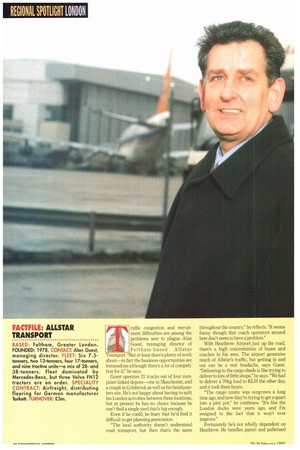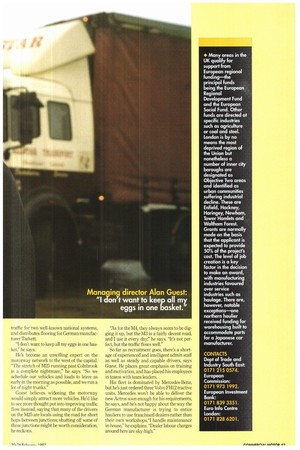raffic congestion and recruitment difficulties are among the problems sent
Page 44

Page 45

If you've noticed an error in this article please click here to report it so we can fix it.
to plague Alan Guest, managing director of Feltham-based Allstar Transport. "But at least there's plenty of work about—in fact the business opportunities are tremendous although there's a lot of competition for it," he says.
Guest operates 21 trucks out of four computer-linked depots—one in Manchester, and a couple in Colnbrook as well as his headquarters site. He's not happy about having to split his London activities between three locations, but at present he has no choice because he can't find a single yard that's big enough.
Even if he could, he fears that he'd find it difficult to get planning permission.
"The local authority doesn't understand road transport, but then that's the same throughout the country," he reflects. "It seems funny though that coach operators around here don't seem to have a problem."
With Heathrow Airport just up the road, there's a high concentration of buses and coaches in his area. The airport generates much of Allstar's traffic, but getting in and out can be a real headache, says Guest. "Delivering to the cargo sheds is like trying to deliver to lots of little shops," he says. "We had to deliver a 70kg load to KLM the other day, and it took three hours.
"The cargo centre was outgrown a long time ago, and now they're trying to get a quart into a pint pot," he continues. "It's like the London docks were years ago, and I'm resigned to the fact that it won't ever improve."
Fortunately he's not wholly dependent on Heathrow. He handles parcel and palletised traffic for two well-known national systems, and distributes flooring for German manufacturer Tarkett.
"I don't want to keep all my eggs in one basket," he says.
He's become an unwilling expert on the motorway network to the west of the capital. "The stretch of M25 running past Colnbrook is a complete nightmare," he says. "So we schedule our vehicles and loads to leave as early in the morning as possible, and we run a lot of night trunks."
Guest believes widening the motorway would simply attract more vehicles. He'd like to see more thought put into improving traffic flow instead, saying that many of the drivers on the M25 are locals using the road for short hops between junctions; shutting off some of these junctions might be worth consideration, he reckons.
"As for the M4, they always seem to be digging it up, but the M3 is a fairly decent road, and I use it every day," he says. "It's not perfect, but the traffic flows well."
So far as recTuitment goes, there's a shortage of experienced and intelligent admin staff as well as steady and capable drivers, says Guest. He places great emphasis on training and motivation, and has placed his employees in teams with team leaders.
His fleet is dominated by Mercedes-Benz, but he's just ordered three Volvo F1112 tractive units. Mercedes won't be able to deliver the new Actros soon enough for his requirements, he says, and he's not happy about the way the German manufacturer is trying to entice hauliers to use franchised dealers rather than their own workshops,"I handle maintenance in-house," he explains. "Dealer labour charges around here are sky-high."
• Many areas in the UK qualify for support from European regional funding—the principal funds being the European Regional Development Fund and the European Social Fund. Other funds are directed at specific industries such as agriculture or coal and steel. London is by no means the most deprived region of the Union but nonetheless a number of inner city boroughs are designated as Objective Two areas and identified as urban communities suffering industrial decline. These are Enfield, Hackney, Haringey, Newham, Tower Hamlets and Waltham Forest. Grants are normally made on the basis that the applicant is expected to provide 50% of the project's cost. The level of job creation is a key factor in the decision to make an award, with manufacturing industries favoured over service industries such as haulage. There are, however, notable exceptions—one northern haulier received funding for warehousing built to accommodate parts for a Japanese car manufacturer.
CONTACTS
Dept of Trade and Industry South East: 0171 215 0574. European Commission: 0171 973 1992. European Investment Bank:
0171 839 3351. Euro Info Centre London: 0171 828 6201.


























































































































